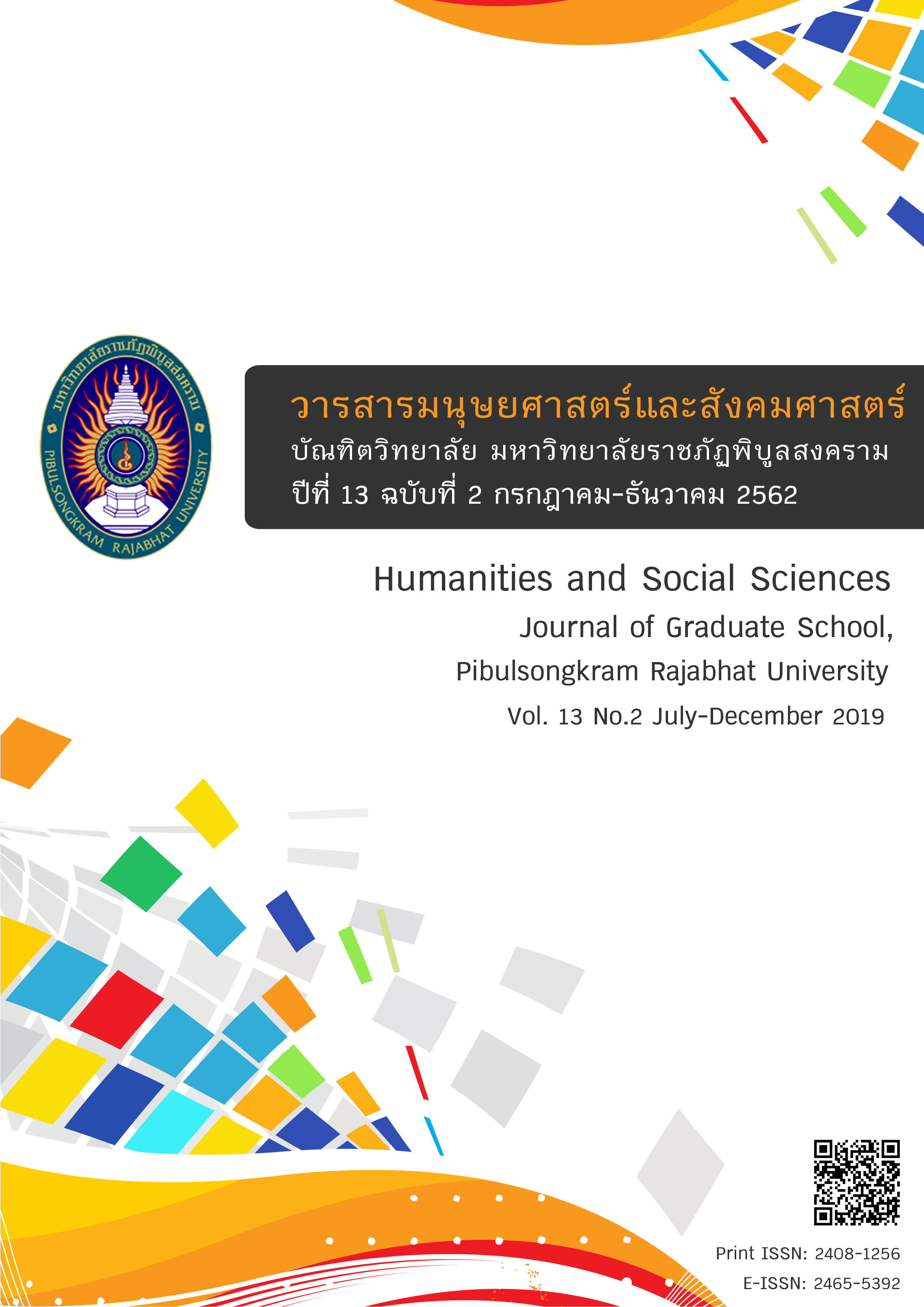Development of School Effectiveness Model for Secondary Schools under The Office of The Basic Education Commission
Keywords:
Model development, Effectiveness, Secondary schoolsAbstract
This research aims to develop the school effectiveness model and to study factors affecting the school effectiveness for secondary schools under the Office of the Basic Education Commission. The sampling size for data analysis approximately contains 5–10 respondents per one parameter which will be in calculation for this research. Also, there are 20 observable variables, therefore; the sampling size contains 234 administrators coming from each school by conducting the multi-stage random method. In addition, the research instrument is a questionnaire for finding validity which is between 0.60 - 1.00, and finding reliability which shows Alpha Coefficient of 0.90. The data analysis is conducted by using Mplus Program (Version 8.1). The research result found that the effectiveness model of secondary schools developed by the researchers is appropriate and consistent with the empirical data in a good level by considering =134.902, =127, = 0.2989, =1.0624, =0.013, = 0.032, =0.998, =0.997. However, factors affecting the effectiveness of secondary schools under the Office of the Basic Education Commission consist of organizational competency, organizational atmosphere, organizational culture, as well as leadership. These factors influence directly toward the school effectiveness.
References
ธวัชชัย ตั้งอุทัยเรือง. (2557). โมเดลความสัมพันธ์เชิงสาเหตุของประสิทธิผลของโรงเรียนประถมศึกษาขนาดเล็ก สังกัดสำนักงานคณะกรรมการการศึกษาขั้นพื้นฐานในภาคกลางของประเทศไทย (วิทยานิพนธ์ปรัชญาดุษฎีบัณฑิต). มหาวิทยาลัยคริสเตียน, นครปฐม.
บุญเหลือ ทาไทสง. (2557). โมเดลความสัมพันธ์เชิงสาเหตุของปัจจัยที่มีอิทธิพลต่อประสิทธิผลของโรงเรียนประถมศึกษา สังกัดสำนักงานเขตพื้นที่การศึกษาประถมศึกษาในจังหวัดนครราชสีมา (วิทยานิพนธ์ปรัชญาดุษฎีบัณฑิต). มหาวิทยาลัยราชภัฎนครราชสีมา, นครราชสีมา.
ภารดี อนันต์นาวี. (2545). ปัจจัยที่ส่งผลต่อประสิทธิผลของโรงเรียนประถมศึกษา สังกัดสำนักงานคณะกรรมการการประถมศึกษาแห่งชาติ (วิทยานิพนธ์ปรัชญาดุษฎีบัณฑิต). มหาวิทยาลัยบูรพา, ชลบุรี.
วิไลวรรณ์ เกตุบรรลุ. (2543). ความสัมพันธ์ระหว่างการดำเนินงานกับประสิทธิผลของสถานศึกษา สังกัดกรมอาชีวศึกษา เขตการศึกษา 12 (วิทยานิพนธ์การศึกษามหาบัณฑิต) มหาวิทยาลัยบูรพา, ชลบุรี.
ศราวุธ กางสำโรง. (2559). อิทธิพลของภาวะผู้นำของผู้บริหารสถานศึกษาที่ส่งผลต่อประสิทธิผลของสถานศึกษา สังกัดสำนักงานเขตพื้นที่การศึกษาประถมศึกษามหาสารคาม เขต 1 (วิทยานิพนธ์ครุศาสตรมหาบัณฑิต). มหาวิทยาลัยราชภัฎมหาสารคาม, มหาสารคาม.
สุริยัน ทรัพย์ผล. (2559). ปัจจัยด้านองค์การและภาวะผู้นำที่มีอิทธิพลต่อประสิทธิผลของการบริหารโรงเรียนประถมศึกษาในจังหวัดลุ่มนำโขง ภาคตะวันออกเฉียงเหนือตอนบน. วารสารวไลยอลงกรณ์ปริทัศน์ (มนุษยศาสตรและสังคมศาสตร์), 6(3), 81-92.
สัมฤทธิ์ กาเพ็ง. (2551). ปัจจัยทางการบริหารที่มีอิทธิพลต่อประสิทธิผลของโรงเรียน : การพัฒนาและตรวจสอบความตรงของตัวแบบ (วิทยานิพนธ์ปรัชญาดุษฎีบัณฑิต). มหาวิทยาลัยขอนแก่น, ขอนแก่น.
สมนึก การีเวท. (2559). รูปแบบความสัมพันธ์เชิงสาเหตุของปัจจัยที่ส่งผลต่อประสิทธิผลการจัดการศึกษาของโรงเรียน. วารสารวิชาการเครือข่ายบัณฑิตศึกษา มหาวิทยาลัยราชภัฏภาคเหนือ, 6(10), 119-136.
อํารุง จันทวานิช. (2547). แนวทางการบริหารและการพัฒนาสถานศึกษาสูโรงเรียนคุณภาพ. กรุงเทพฯ: พริกหวานกราฟฟิค.
Best, J., & Kahn, J. V. (1993). Research in Education (7th ed). Boston: Allyn and Bacon.
Burke. W., & Litwin. G. (1992). A Causal Model of Organizational Preformance and Change. Journal of Management, 18(3), 523–545.
Cameron, K. S., & Ettington, D. R. (1998). Handbook of Theory and Research: The Conceptual Foundation of Organizational Culture. New York: Agatton Press.
Church, D. M. (2012). Leadership Style and Organizational Growth : A Correlation Study. Purdue University.
Daft, R. L. (1992). Organization theory and design. Singapore: Info Access.
Downey, H. K., & Slocum, J. W. (1975). Measures, research and sources of variation. Administrative Science Quarterly, 18, 562-577.
Foss, N. J., & Knudsen, C. (2013). Towards a competence theory of the firm. Rutledge. San Francisco: Jossey: Bass.
Good, C. V. (1959). Dictionary of Education (2nd ed.). New York: McGraw - Hill Book Company.
Hair, J. F., Anderson, R. E., Tatham, R. L., & Black, W. C. (2006). Multivariate data analysis (6th ed.). New Jersey: Prentice-Hall.
Hooper, D., Coughlan, J., & Michael, M. R. (2008). Structural Equation Modelling: Guidelines for Determining Model Fit. Electronic Journal of Business Research Methods, 6(1), 53-60.
Hoy, W. K., & Miskel, C. G. (1991). Educational administration theory research and practice (4th ed.). Singapore: McGraw-Hill.
Hoy, W. K., & Miskel, C. G. (2005). Educational Administration: Theory, Research, and Practice (4th ed.). New York: McGraw-Hill.
Omolade, R. A. (2007). A systems test of effectiveness of elementary schools in Nigeria. 3247173 Ed.D., St. John’s University (New York), Retrieved from https://search.proquest.com/docview/304720720?accountid=3515 ProQuest Dissertations & Theses Full Text database.
Ruhl, M. L. (1985). The development of a survey of school effectiveness. Dissertation Abstracts International, 46(11), 3216-A.
Sathe, V. (1985). Culture and Related Corporate Realities. Irwin, Homewood, IL.
Scheerens, J., & Bosker, R. J. (1997). The Foundations of Educational Effectiveness. Oxford: Elsevier Science Ltd.
Steers, R. M. (1977). Organization Effectiveness. California: Goodyear Publishers.
Sunday, J. K., Adekunle, I., & Roseline, O. (2014). Organizational survival : The effects of leadership Skill an Strategy. Science Journal of Business and Management, 2(2), 44-49.
Youngs, P., & King, M. B. (2002). Factor Affecting Education Administration. Ohio: Ohio State University.
Downloads
Published
How to Cite
Issue
Section
License
Any articles or comments appearing in the Journal of Humanities and Social Sciences, Rajabhat Phibulsongkram University, are the intellectual property of the authors, and do not necessarily reflect the views of the editorial board. Published articles are copyrighted by the Journal of Humanities and Social Sciences, Rajabhat Phibulsongkram University.









